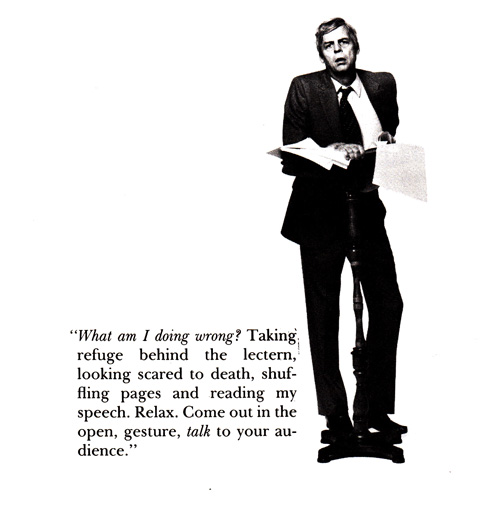The conclusion also should not be excessively long, and not necessarily used to add extra time to a speech. No new topics or points should be introduced and the conclusion should only be used to restate your opinions or your main points. Often times it may be a good idea to say "in conclusion" or "in summary". Other times a call to action may be more appropriate. Other suggestions for conclusions include but are not limited to quotes, rhetorical questions, restating the thesis, or humor.
Sunday, October 19, 2014
Conclusions
The conclusion of the speech is the last thing that the audience, or listener, hears. It is your time to make a lasting impression upon the listener and to allow them to remember your speech.A conclusion shouldn't be abrupt, and should be worked into and blended into the body of the speech. the main topic of the speech should flow into the conclusion.
Sunday, October 12, 2014
Stage Fright
Stage Fright, or performance anxiety is a real, legitimate phobia that many people suffer from. But there are also many ways to remedy or alleviate the anxiety.
Methods Include:
Practice and Preparation
Self-Confidence
Relaxation
Many people fear that they may not be "good enough" for their audience. In all actuality, with a little confidence, practice, and inspiration, the speaker will do well. Stress is something that is mental, to 'psyche' us out and to scare us, but nervousness is nothing to be afraid of. Even the greatest of public speakers can be nervous. But, they proceed, they carry on, and they succeed.
Stage Fright and nervousness are nothing to worry about.
 -Geroge Plimpton on The Art of Public Speaking
-Geroge Plimpton on The Art of Public Speaking
http://www.brainpickings.org/2013/04/03/george-plimpton-public-speaking/
stage fright.pptx by Katie Dennert
Methods Include:
Practice and Preparation
Self-Confidence
Relaxation
Many people fear that they may not be "good enough" for their audience. In all actuality, with a little confidence, practice, and inspiration, the speaker will do well. Stress is something that is mental, to 'psyche' us out and to scare us, but nervousness is nothing to be afraid of. Even the greatest of public speakers can be nervous. But, they proceed, they carry on, and they succeed.
Stage Fright and nervousness are nothing to worry about.
 -Geroge Plimpton on The Art of Public Speaking
-Geroge Plimpton on The Art of Public Speakinghttp://www.brainpickings.org/2013/04/03/george-plimpton-public-speaking/
stage fright.pptx by Katie Dennert
Subscribe to:
Posts (Atom)